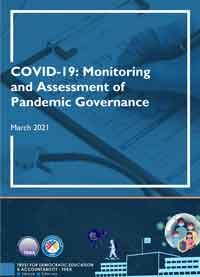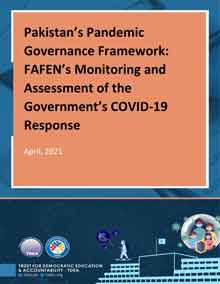- TDEA-FAFEN Releases Findings of Socio-economic Impact Assessment of COVID-19 During First Wave
ISLAMABAD, April 9, 2021: Federal and provincial governments need to expand the pandemic relief programs and improve their accessibility by easing down the eligibility criteria to mitigate the immediate risks for women and prevent exacerbation of the existing gender gaps during ongoing COVID-19 wave, recommends a survey report by Trust for Democratic Education and Accountability and Free and Fair Election Network (TDEA-FAFEN).
Based on a survey of 6000 households from 20 districts across Pakistan, the Socio-economic Impact Assessment Report highlights the issues faced by the marginalized communities in general, and women in particular during the first wave of pandemic.
The findings suggested that women and girls were more vulnerable to non-health impacts of pandemic. Women-led households financially suffered more than men-led households as the former had a lower monthly income than the latter even before the pandemic-associated economic slowdown. Social distancing policies and lockdowns have left the most vulnerable women without income and sustenance. Around 88 percent women-led households, 62 percent salaried individual women, and 70 percent self-employed individual women reported a declining monthly income during the lockdown. Nearly 27 percent employed women lost their jobs while 12 percent women entrepreneurs were forced to shut down their businesses during this period. In addition, almost 15 percent women face interruptions in receiving salaries.
Some other pandemic-related issues included increase in health expenses of the surveyed households as the respondents reported additional spending on health items. An overall decrease in the educational expenditure was also observed in the aftermath of the pandemic. While mental stress and irritability increased for the higher income groups more than the lower income groups.
An incongruity was observed in gender relations along with a grim picture of the psychosocial environment particularly for women. Around 31 percent respondents reported an increasing trend of gender-based violence. Women in nearly 30 percent rural and 31 percent urban households faced violence during the lockdown restrictions. Moreover, 43 percent respondents reported increased instances of stress and other mental illnesses.
Among the distressing situation, there were some positive trends observed at the community level. Local initiatives, such as relief committees, were formed by people of their own volition to assist the affected people in a neighborhood. As many as 27 percent respondents reported receiving help from political parties and even a larger number of women, i.e. 35 percent, confirmed having received support from political parties. Majority of the respondents (66 percent) reported satisfaction with government’s handling of the situation while 34 percent were dissatisfied.
With regard to inflation and price control, government’s response to the lockdown seemed largely inadequate as 90 percent respondents reported an increase in prices of basic necessities in their area.
For all economic relief programs, the variance in the economic impact on women-led households and individual working women demands gender-sensitive relief programs to counter the impact of COVID-19 and any future pandemic/crisis of similar nature and/or scale.
More specifically, the relief programs may introduce financial assistance programs not only for low-income individuals but extend the programs to part-time workers, the self-employed and freelancers with a proactive approach to reach out to women, especially home-based workers. In particular, the programs shall provide assistance to women entrepreneurs hit by crisis in the form of no interest or low-interest loans, business stimulus packages and delayed repayments. In face of rising cases of GBV, the government may also consider strengthening the mechanisms for violence survivors.
To download Urdu Press Release, click here | To download the complete report, click here



